EQUINE WELFARE NETWORK PROFILE
Penny Lane Foal Rescue

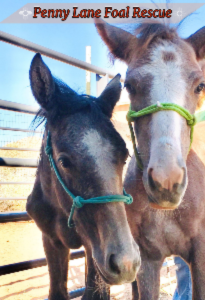
Penny Lane Foal Rescue
3031 Oculus Loop NE
RIO RANCHO, NM 87144
Mailing Address:
3031 Oculus Loop NE
RIO RANCHO, NM 87144
Phone: 505-373-3203
MAKE AN INQUIRY
View our WEBSITE
EIN: 83-2993708Founded: 2019
View our PHOTO GALLERY
Profile Last Updated December 29, 2025Public Charity
NEXT CHAPTERS! Click here to view listings of our adoptable equines: King - Max - Rigby - Rocky - Sky - Sunny

2025
The Guardian Seal of Transparency is awarded annually to recognize an organization's commitment to transparency and accountability by their willingness to make comprehensive data about their programs, horse care practices, and governance available for public scrutiny. The Guardian Seal of Transparency is NOT an endorsement.
Awarded Annually
Last Updated: November 30, 2025
Last Updated: November 30, 2025
Penny Lane Foal Rescue has not attained the Guardian designation for 2026.
MISSION & PROGRAMS
Mission:Penny Lane Foal Rescue is committed to rescuing and rehabilitating orphaned foals throughout New Mexico and on the Navajo Nation, providing intensive socialization and foundation skills, and placing them into their loving, forever homes. We specialize in serving medically fragile orphaned Mustangs culled following the round ups.
We are dedicated to being a strong community resource for caretakers of orphaned foals, providing education, support, and financial assistance to help these most vulnerable little ones to thrive.
We are dedicated to bringing youth and volunteers together with our rescues to learn, grow, and achieve their full potential. We train our community to assist with rehabilitating, socializing, and providing foundation skills for our orphaned foals in preparation for adoption into their forever, loving homes.
Our organization provides programs involved with equine rescue, adoption & retirement
Our organization provides outreach and/or public education programs involving horses.
Over 90% of our total programs and services are equine-related.
Our organization is directly responsible for the care and shelter of equines involved in our programs.
Our organization does not CURRENTLY use satellite, overflow, foster, and/or outreach facilities.
Please describe what steps your organization takes to ensure that:
1) all interactions between your equines and people are mutually beneficial and conducted in accordance with the Guidelines for Human-Equine Interactions stated below;
2) all equines in the care of our organization and/or equines that participate in the organization's program have access to clean drinking water at all times; nutritious food in sufficient quantity, including natural forage such as pasture grass and/or hay; appropriate veterinary, farrier, and dental care; shelter and protection from the weather; sufficient safe space to move around comfortably on a daily basis; and daily opportunity to freely interact and have contact with other equines:
Penny Lane Foal Rescue provides much-needed socialization and foundation skills for our rescues to learn safe and appropriate interactions with humans of all ages. Our Horse Leaders and adult volunteers are empowered to develop respectful, loving connections with our young Mustangs and to incorporate positive associations towards learning basic skills, groundwork, and advanced training. Our participants have opportunities to build a lifelong love and understanding of equines, gain a significant understanding of their ongoing care and behaviors, and assist with the operations of a working rescue.
Our horses are turned out together throughout the day into the paddock and arena to obtain extensive opportunities for physical activity and socialization. While many of our rescues eat alone in their own designated areas to prevent competition for resources, they are given the rest of the day to interact within small and large groups, depending on their preferences.
Our rescues are fed twice daily with high quality alfalfa and Timothy hay, as well as equine pellet complete feed specifically designed for their needs. Younger foals are provided milk replacer every two to four hours, depending on their age and foal specific feed. They are given free choice Timothy and alfalfa in small amounts throughout the day. Water tanks are checked frequently and electric heaters are installed throughout the winters. Mineral blocks are located near the tanks for their convenience. All of our rescues receive psyllium every week to prevent sand colic and are provided rice bran and beet pulp to maintain optimal weight, if needed. Nearly all of the horses are blanketed when temperatures drop below 45 degrees and have access to shelter from the elements at all times.
All of our rescues are assessed by our veterinarian to get a treatment plan shortly upon their arrival. They receive Ulcergard and are often placed on antibiotics. They are provided probiotics to prevent stomach distress. Each year, our rescues receive complete vaccinations and their teeth are checked for possible issues. Our veterinarian is contacted immediately if any of our rescues show signs of discomfort. We geld early to prevent unwanted births and stallion-like behaviors.
Penny Lane Foal Rescue knows first hand what happens to orphaned foals in the care of well-intentioned individuals with limited knowledge and resources. These most vulnerable little ones have a very high mortality rate when all of their emotional and physical health needs are not addressed. It is not enough that these orphans live, but they need to thrive in their environment. Each of our orphans is matched with babysitter goats that helps them with their emotional needs while they are rehabilitating and in quarantine. From the beginning of their arrival, they are examined by our veterinarian and given a treatment plan. These orphans receive high quality, foal-specific feed to help them grow into healthy weanlings and yearlings. They also receive thousands of hours of socialization and foundation skills from our youth participants and volunteers while they are at our facility.
We believe that orphaned foals are often an underrepresented population among equine rescues. Nearly all of the orphans that are transferred to our facility are on the brink of death. They have been mauled by wild dogs, attacked by stallions, or left for dead after being culled out from the round-ups since they are too young to be sent to slaughter. Although we are entirely volunteer-run, we are skilled rehabilitators and socializers of medically fragile orphaned Mustang foals. We are also skilled in continuing their foundation skills and providing a thriving environment for these Mustangs as they age and await placement into their forever homes. inspire our entire community of volunteers, youth participants, and supporters to give all that we
There are very few equine rescues that focus on orphaned foals, and even fewer that focus on the care of feral Mustangs. Their resilience, trust, and warmth of spirit, despite their early trauma can to help these special creatures to thrive. We are entrusted with their social, emotional, and physical care and take our responsibilities very seriously to ensure those needs are met each and every day.
Equine Transition Services:
Overview of our programs involved with rescue, rehabilitation, retraining, re-homing and/or retirement:
Penny Lane Foal Rescue is committed to rescuing and rehabilitating orphaned and abandoned foals from throughout New Mexico, providing intensive socialization and foundation skills training, and placement into their loving, forever homes. We specialize in serving medically fragile orphaned foals culled from the round ups.
Penny Lane Foal Rescue rescues foals from round-ups on public land and reservation, accepts transfers from other rescues and reservation Impound Facilities, and accepts surrenders from owners who can no longer care for their foals. The foals remain at our facility, and are unavailable for adoption, until they are completely rehabilitated, socialized, gelded, microchipped, and vaccinated. They continue securing their foundation skills while awaiting adoption into their loving, forever homes. While they are at Penny Lane Foal Rescue, these orphans receive on-going vet and farrier care, intensive socialization, and extensive foundation skills. Once adopted, Penny Lane Foal Rescue provides a minimum of monthly follow-up for adoptees throughout the first year of placement and quarterly follow-ups with adopters and adoptees following the probationary period to ensure the safety of our equines.
Through our Elva Mico Emergency Assistance Fund, Penny Lane Foal Rescue provides education, support, resources, and financial assistance to other care takers of orphaned foals throughout New Mexico and on the Navajo Nation. Our Orphaned Foal Emergency Kits contain 50 lbs. of foal-specific powdered and pelleted milk replacers, 100 pounds of foal-specific complete feeds, 1 month of Ulcergard, 1 winter blanket, 1 foal halter and lead rope, thermometer, emergency medical supplies, and instructions for their use. We also provide frequent follow-up and case management services pertaining to the care of these orphans throughout the first six months their life ensuring these most vulnerable little ones thrive within their community. Additionally, Penny Lane Foal Rescue provides catastrophic foal care assistance grants within our state to pay veterinarians directly for their services related to saving orphaned foals.
Outreach and/or Public Education:
Penny Lane Foal Rescue is involved in animal welfare consortiums and groups throughout neighboring communities to advocate for the improvement of equine standards of care. We offer education and resources pertaining to the care of foals across New Mexico. We have attended school and community events to promote equine welfare through hands-on educational experiences in previous years but have not been as active this past year. Penny Lane Foal Rescue provides several opportunities throughout the week at our facility for adult volunteers and youth to assist in the rehabilitation, socialization, and foundation skills of our rescued orphaned foals.
Penny Lane Foal Rescue has partnered with rural veterinarians across the Navajo Nation offering financial support to promote comprehensive gelding clinics in Crownpoint and Shiprock. We offer gelding assistance for colts through a year old to encourage early gelding and responsible horse ownership throughout New Mexico and on the Navajo Nation. We provide education and assistance to the Rangers and individuals on the reservations pertaining to the care and placement of orphaned foals left behind after round ups. We advertise our emergency orphaned foal assistance regularly on Craigslist in the Farm and Garden section throughout New Mexico so that those caring for these most vulnerable little ones can get the resources and support needed to help them not only survive, but to thrive.
Research/Medical Use of Equines:
Our organization has never made, and would not ever consider making, equines available for research studies or medical training that involves invasive procedures and/or that which may cause pain or suffering to the equine.
Religious Affiliation:
Our organization does not promote religious education, religious purposes, or a specific religious faith or use donations for religious education or religious purposes; require participants to be of a certain faith; require participation in religious, instruction, activities or services; or require participation in prayer, worship, religious instruction or other religious activities as a condition of receiving social or secular services offered.
Auction Donation:
Our organization has never allowed, or would not consider allowing, an equine to be sold, transferred, released, or otherwise placed into possession of any person or organization that would cause or allow the equine to be sold at auction for slaughter.
Our Programs/Activities that are not equine-related and/or involving animals other than equines:
Penny Lane Foal Rescue uses highly socialized goats as babysitters for the orphaned foals. Because these most vulnerable little ones must be quarantined from the rest of the herd until they do not pose a threat, they need the constant companionship of another herd mate that is not susceptible to the biohazards of equine-specific bacteria and viruses.
POLICIES: INTAKE, ASSESSMENT & TRAINING
Prior to a horse being accepted and/or arriving at the facility, the organization has the following policies in place:The owner of a potential equine is interviewed over the phone or in person prior to seeing the equine
The equine is evaluated at its place of residence
The owner completes an application/contract which constitutes the agreement between the owner and our organization when the equine is acquired from the equine's owner other than by seizure or by abandonment
The owner is financially responsible for the shipping of the equine to and from the organization
If health records are not available or are out-of-date, our veterinarian will administer appropriate vaccinations
Not Checked:
A health certificate signed by a veterinarian and dated no more than seven days prior to arrival is provided to our organization either prior to or upon arrival of the equine attesting to the health status of the equine
A health certificate signed by a veterinarian and dated no more than seven days prior to arrival is provided to our organization either prior to or upon arrival of the equine attesting to the health status of the equine
Trial Period: Check all that apply:
Equines are not taken on trial
Upon intake, the organization has the following quarantine policy in place:
The equine is confined to a designated and separate area for isolation and quarantine at the facility for a prescribed period of time
Not Checked:
The equine is confined to a designated and separate area for isolation and quarantine off-site for a prescribed period of time
The equine is not quarantined
The equine is confined to a designated and separate area for isolation and quarantine off-site for a prescribed period of time
The equine is not quarantined
The typical length of quarantine is: More than 30 days
Following arrival of the equine at the facility, the following is performed:
Physical examination to include temperature, pulse and respiration by a veterinarian upon arrival
Physical examination to include temperature, pulse and respiration by a trained staff member upon arrival
A Henneke Body Conditioning Score or other body conditioning score is assigned by a trained staff member upon arrival
Photographs are taken of each equine upon arrival at the facility and kept with the equine's health records
Physical examination by a farrier
The equine is microchipped if the equine has not been microchipped
Not Checked:
A Henneke Body Conditioning Score or other body conditioning score is assigned by a veterinarian upon arrival
Physical examination by a dentist
A Henneke Body Conditioning Score or other body conditioning score is assigned by a veterinarian upon arrival
Physical examination by a dentist
Horses are assessed for following skills and behaviors:
Retrieval from a pasture/paddock
Leading with a halter and lead rope
Temperament, disposition and attitude, such as rated from very calm to very high spirited
Tolerance to unusual objects and loud noises
Grooming
Bathing
Tolerance to multiple handlers at the same time
Not Checked:
Saddling
Bridling
Lunging
Loading onto and unloading off a trailer
Mounting and dismounting
Riding at the walk
Riding at the trot
Riding at the canter
Riding by a beginner and/or unbalanced rider
Jumping
Driving (Pulling a carriage)
Known vices, i.e., cribbing, biting, kicking, weaving, stall walking, etc
Clipping
Saddling
Bridling
Lunging
Loading onto and unloading off a trailer
Mounting and dismounting
Riding at the walk
Riding at the trot
Riding at the canter
Riding by a beginner and/or unbalanced rider
Jumping
Driving (Pulling a carriage)
Known vices, i.e., cribbing, biting, kicking, weaving, stall walking, etc
Clipping
Our organization has the following policies and procedures in place pertaining to the ongoing assessment of horses in its care:
Physical examination by a veterinarian at least annually
The Henneke Body Condition score or other body conditioning score is updated at least annually by the veterinarian
Vaccinations are administered at least annually
Photographs are taken of each equine annually and kept with the equine's health records
Equines at our facility may be treated by an equine chiropractor
Equines at our facility may be treated by an equine acupuncturist
Equines at our facility may be treated by an equine massage therapist
Not Checked:
The Henneke Body Condition score or other body conditioning score is updated at least annually by a trained staff member
Photographs are taken of each equine monthly and kept with the equine's health records
Equines at our facility may be treated by an equine nutritionist
The Henneke Body Condition score or other body conditioning score is updated at least annually by a trained staff member
Photographs are taken of each equine monthly and kept with the equine's health records
Equines at our facility may be treated by an equine nutritionist
Our organization has the following policies and procedures in place pertaining to the weight-carrying or workload capabilities of horses/equines that are ridden in our care:
No equines are ridden; not applicable
Not Checked:
Our organization evaluates the weight-carrying and workload limitations for each equine that is ridden at least annually
Our organization maintains a written record of the weight-carrying and workload limitations for each equine that is ridden
Our organization does not evaluate the weight-carrying and workload limitations for each equine that is ridden
Our organization evaluates the weight-carrying and workload limitations for each equine that is ridden at least annually
Our organization maintains a written record of the weight-carrying and workload limitations for each equine that is ridden
Our organization does not evaluate the weight-carrying and workload limitations for each equine that is ridden
The following variables are considered in determining the weight-carrying and workload limitations for each equine that is ridden:
No equines are ridden; not applicable
Not Checked:
Equine age, weight, breed, body condition, fitness, balance, health and soundness
Equine conformation to include the top line, length of back, strength and width of loin, bone density (measured by the circumference of the cannon bone just below the knee)
Size, shape, condition and angle of the hooves
Participant weight, height, body proportions, balance, fitness and riding skills as well as behavioral issues and safety concerns
Weight and proper fit of the saddle and other equipment
Terrain and footing in the working environment
Duration and frequency of working sessions, as the frequency with which an equine is subjected to maximum weight carrying and/or workload
Nature and pace of work, repetitive or varied, radius of turns, degree of incline and regularity of footing when equine is subject to maximum weight-carrying capacity
Temperature and/or weather conditions
Seasonal impact on the equines' workload and weight-carrying capabilities and limitations
Our organization does not evaluate the weight-carrying and workload limitations for each equine that is ridden
Equine age, weight, breed, body condition, fitness, balance, health and soundness
Equine conformation to include the top line, length of back, strength and width of loin, bone density (measured by the circumference of the cannon bone just below the knee)
Size, shape, condition and angle of the hooves
Participant weight, height, body proportions, balance, fitness and riding skills as well as behavioral issues and safety concerns
Weight and proper fit of the saddle and other equipment
Terrain and footing in the working environment
Duration and frequency of working sessions, as the frequency with which an equine is subjected to maximum weight carrying and/or workload
Nature and pace of work, repetitive or varied, radius of turns, degree of incline and regularity of footing when equine is subject to maximum weight-carrying capacity
Temperature and/or weather conditions
Seasonal impact on the equines' workload and weight-carrying capabilities and limitations
Our organization does not evaluate the weight-carrying and workload limitations for each equine that is ridden
Horses provided formal training (groundwork or riding): Daily
Additional information about our intake, assessment & training policies and practices:
Penny Lane Foal Rescue rescues, rehabilitates, provides intensive socialization and foundation skills to orphaned and abandoned foals. Most of our orphans arrive days to weeks old. They are immediately met by our vet for evaluation of their needs. They are often started on antibiotics and receive wound care and physical therapy, usually throughout the first month or until completely rehabilitated. They are also on special diets such as milk replacers and formulated foal feed. They receive constant socialization during the rehabilitation process and are partnered with a goat babysitter for companionship. Once rehabilitated and out of quarantine, they are introduced to an equine babysitter. We then begin foundation skills training on a daily basis. All of our colts are gelded usually between 6-8 months old. They continue to receive daily foundation skills training and human/equine socialization on a daily basis until they are adopted.
POLICIES: BREEDING
The organization has the following policies related to breeding and stallions:Our organization does not conduct breeding of equines owned or under the care of our organization.
Our main facility where our organization conducts its programs does NOT breed equines.
Not Checked:
One or more of the facilities where our organization conducts its programs, including foster/temporary care facilities, breeds equines
One or more of the facilities where our organization conducts its programs, including foster/temporary care facilities, are permitted to house stallions
One or more of the facilities where our organization conducts its programs, including foster/temporary care facilities, breeds equines
One or more of the facilities where our organization conducts its programs, including foster/temporary care facilities, are permitted to house stallions
POLICIES: EUTHANASIA
The organization has the following policies related to euthanasia:Our organization will never have an equine euthanized for space
Our organization will have an equine euthanized upon the recommendation of the veterinarian if the equine is a threat to itself, other equines, or people
Our organization will have an equine euthanized upon the recommendation of the veterinarian after all reasonable treatment options have been explored
Euthanasia is done on site when possible to decrease trauma from transport
Disposal of the carcass is handled within 24 hours
Not Checked:
Our organization will never have an equine euthanized under any circumstances
Euthanasia is done at the veterinarian's facility
Our organization will never have an equine euthanized under any circumstances
Euthanasia is done at the veterinarian's facility
The following are authorized to administer the procedure for your organization in accordance with state laws:
Veterinarian
Not Checked:
A certified euthanasia technician
Senior staff with appropriate training
Employee of animal control shelter or humane society with appropriate training
Veterinary student under the supervision of a licensed veterinarian
Not applicable. Our organization prohibits euthanasia under any circumstances
A certified euthanasia technician
Senior staff with appropriate training
Employee of animal control shelter or humane society with appropriate training
Veterinary student under the supervision of a licensed veterinarian
Not applicable. Our organization prohibits euthanasia under any circumstances
Additional information about our euthanasia policies and practices:
We have not had to euthanize any of our foals at our facility. If after all treatment options were exhausted, and at the recommendation of our veterinarian, we would consider euthanizing a foal. If there was a high likelihood of suffering without any opportunity for a good quality of life following rehabilitation, we would definitely consider euthanasia. Currently, we have had a 100% success rate for rehabilitating the medically fragile orphaned foals brought to our facility.
POLICIES: RE-HOMING
View Re-homing AgreementOur organization has the following re-homing (adoption/purchase) policies and procedures in place:
All potential adopters/purchasers complete a written contract which constitutes the agreement between our organization and the new owner
Our organization will only re-home an equine to a location where another equine resides
Potential adopters/purchasers must visit our organization and be observed with the equine on site
The distance of a potential adopter/purchaser's home from our facility is a consideration for when re-homing an equine
Our organization conducts a site visit of the adopter/purchaser's facility before the transfer of the equine to the adopter/purchaser's facility
Potential adopters/purchasers are encouraged to do a short-term, on-site foster with the equine
Not Checked:
Our organization does NOT re-home an equine to first time equine owners
Adopters/purchasers are NOT required to provide updates
Our organization does NOT re-home an equine to first time equine owners
Adopters/purchasers are NOT required to provide updates
Our organization has the following policies and procedures related to horses that need to be retired, are no longer able to contribute to the mission of the organization, and/or are no longer manageable:
Equines may remain at our organization for their lifetimes
Equines may be found suitable homes by our organization
In the case an equine is unmanageable and demonstrates repeated dangerous behaviors, the equine may be euthanized upon the recommendation of the veterinarian
In the case an equine is unsound and/or unhealthy and cannot be treated to relieve suffering, the equine may be euthanized upon the recommendation of the veterinarian
The organization will accept financial responsibility for equines in the current care of the organization that need to be retired or are no longer able to contribute to the mission of the organization if all alternatives have been explored to find the equine an appropriate placement and space is not available for the equine to remain at the organization.
Not Checked:
Equines may be returned to their owners
Equines may be sent to auction
If a suitable home cannot be located within 12 months, the equine may be euthanized
Equines may be returned to their owners
Equines may be sent to auction
If a suitable home cannot be located within 12 months, the equine may be euthanized
The uploaded Re-homing agreement includes the following re-homing (adoption/purchase) statements:
The agreement states that the re-homed equine CANNOT be sold, adopted, transferred, auctioned, released, given away, or otherwise placed into the possession of another individual or organization under any circumstances and must be returned to our organization should the adopter decide that he/she is no longer able, or no longer wishes, to care for the equine.
The agreement reflects that any individual or organization in possession of the equine as of the date of the agreement and any time thereafter is bound to not sell the equine at auction for slaughter or allow the equine to be sold, transferred, released, or otherwise placed into possession of any person or organization that will cause or allow the equine to be sold at auction for slaughter.
The agreement states that should the adopter decide to re-home the equine, the adopter must grant the organization first right of refusal prior to the equine being placed into the possession of any individual or organization intending to take possession of the equine for any reason.
The agreement states that should the adopter decide to re-home the equine, our organization must grant approval of any individual or organization intending to take possession of the equine for any reason prior to the equine being placed into the possession of such individual or organization, including being provided written notification of the name, address, and telephone number of any individual or organization intending to take possession of the equine for any reason.
The agreement states that the terms of our organization's agreement will be binding on any future individual or organization taking and/or in possession of the equine for any reason.
The agreement states that re-homed equines cannot be bred
The agreement states that if there is any breach of contract the equine must be returned to our organization
The agreement states that our organization reserves the right to make scheduled visits
The agreement states that adopters/purchasers can return an equine to our organization free of charge
The agreement states that adopters/purchasers are required to provide updates (photos, vet records) for one year
Our organization microchips all equines that are not already microchipped before the adoption and/or transfer of the equine if the organization has the authority to microchip the equine.
The agreement states that adopters/purchasers are required to provide updates (photos, vet records) for as long as the adopter/purchaser is responsible for the care of the equine
Not Checked:
The agreement states that should the adopter decide to re-home the equine, our organization must be notified of the name, address, and telephone number of any individual or organization intending to take possession of the equine for any reason prior to the equine being placed into the possession of such individual or organization.
The agreement states that our organization reserves the right to make unannounced visits
The agreement states that adopters/purchasers can return an equine to our organization for a fee
The agreement states that adopters/purchasers are required to provide updates (photos, vet records) for two years
The agreement includes the microchip number of the equine.
None of the statements are included.
The organization does not re-home equines under any circumstances; our organization retains custody of our equines and ensures care of the equines for their lifetimes.
Our organization does not have the authority to transfer ownership and/or does not own any of the equines involved with our programs.
The agreement states that should the adopter decide to re-home the equine, our organization must be notified of the name, address, and telephone number of any individual or organization intending to take possession of the equine for any reason prior to the equine being placed into the possession of such individual or organization.
The agreement states that our organization reserves the right to make unannounced visits
The agreement states that adopters/purchasers can return an equine to our organization for a fee
The agreement states that adopters/purchasers are required to provide updates (photos, vet records) for two years
The agreement includes the microchip number of the equine.
None of the statements are included.
The organization does not re-home equines under any circumstances; our organization retains custody of our equines and ensures care of the equines for their lifetimes.
Our organization does not have the authority to transfer ownership and/or does not own any of the equines involved with our programs.
Our organization requires references from the following:
Veterinarian
Farrier
Personal/Other
Not Checked:
Not applicable or no references required.
Not applicable or no references required.
Transfer of ownership occurs: Our organization retains ownership of the equine for its lifetime
The average equine re-homing (adoption/purchase) fee received by your organization:
Less than $200
Additional information about our rehoming policies and practices:
For the first year of adoption process, the Director conducts weekly on-site visits during the first month of placement to assist with any training or care issues. Following the first month, a monthly visit is conducted on-site for the next 11 months. Ownership is transferred to the new adopter, but Penny Lane Foal Rescue remains as the primary contact on the microchip for the life of the horse. On our transfer document it stipulates that any Penny Lane Foal Rescue equine that has been adopted must return to our facility if the adopter cannot or does not want to care for it any longer. We have stipulated that we will pursue civil litigation for the entire cost of caring for the adopted horse if this mandate is breached. Our adopters remain in contact with us following the transfer of ownership with photos, emails, and texts.
Penny Lane Foal Rescue can serve 15 horses at the facility, although we have systems in place to operate below capacity at 10-11 equines, so that we will always have space available if one of our adopted horses needs to be returned. We have partnered with rescues experienced with rehabilitating orphans and working with wild horse in Arizona and northern New Mexico to have the healthier, older orphans transferred to these other facilities. We can then focus on the medically fragile orphans that are sick or have been attacked by wild dogs or stallions since many of the other rescues often do not have the experience, time, or resources to rehabilitate them. We offer financial assistance to the other rescues towards their care so they can receive what they need, including gelding assistance and vaccinations. By triaging these orphans with our partners, Penny Lane Foal Rescue maintains the resources to take in those with the most intensive needs, while keeping space available for any possible adoption returns to our facility.
EQUINE CARE & SHELTER/FACILITY INFORMATION
Our organization does not CURRENTLY use satellite, overflow, foster, and/or outreach facilities.Total facilities at which our organization cares for and shelters horses used in our programs: 1
Penny Lane Foal Rescue
3031 Oculus Loop NE Rio Rancho NM 87144
Currently operational
Total number of horses/equines currently involved with your programs, under your care, and/or owned by your organization at this facility: 10
Total number of horses at this facility NOT INCLUDING those counted above: 0
Maximum capacity of horses at this facility: 15
Does your organization own, lease or use a part of this facility? Lease
Provide the contact information for the individual or organization responsible for investigating abuse in the county where the facility is located, including mailing address, email address, and phone information.
New Mexico Livestock Board 300 San Mateo NE #1000 Albuquerque, NM 87108 (505) 841-6161 New Mexico Livestock Boardwww.nmlbonline.com
Does your organization conduct Equine Assisted Services (EAS) at this facility in accordance with the EQUUS Foundation Guidelines on Qualifications of Organizations Conducting Equine Assisted Services (EAS)? No
ADDITIONAL INFORMATION ABOUT THIS FACILITY:
The property is on a dry, fenced-in lot with shelters composed of metal. Some of these shelters have their own turnout areas. Infrared security cameras are in operation around the entire facility with two weeks of recording. While a fire inspection is conducted, there are little to no flammable materials that could ignite on the facility and potentially harm the horses. We have purchased a fire extinguisher, if needed.
When feeding in groups, Penny Lane Foal Rescue ensures that equines are provided with their individualized feeding plans, including supplements, according to the equine's age, breed/type, condition, size, work level and any health issues, consisting of nutritious food provided in sufficient quantity and access to adequate natural forage, or be fed daily, or as recommended by the organization's veterinarian. Six of the ten rescues at our facility have a separate feeding area because of their special dietary needs and feeding habits.
There are two groups of two horses that eat together in their separate areas. One group of two shares a 28' shelter with two openings and two large feeders on each side of the shelter. These two Mustangs have similar dietary needs, eating habits, are close in age and physical conformation, and typically stay at their own feeders which prevents competition and aggression over resources.
The other group of two Mustangs eat well together and do not demonstrate acts of aggression towards one another during feeding. The older Mustang is housed with a much younger Mustang. The older Mustang is often on high alert when left alone and leaves his food repeatedly to check for danger. The younger Mustang helps calm the older one and allows him to focus on eating. There are two large troughs, one in the stall, where the younger one eats, and one in the run-out area, where the older one eats, which is open to the upper arena. Each has their own special dietary needs met in their specific trough. If necessary, this area is monitored by our volunteers until the grain and supplements have been consumed by the older Mustang who requires more calories since he refuses to wear a blanket.
Veterinarian Information: Penny Lane Foal Rescue (*Main) Currently operational
Veterinarian: Dr. Bradley Root and Dr. Janae Eberly
Clinic Name: ABQ Equine Clinic
6901 2nd St NW
Albuquerque NM 87107
Phone: 505-344-1131
Grounds: Penny Lane Foal Rescue (*Main) Currently operational
Total acreage dedicated specifically to the horses: 3
Our organization has use of the following at this facility:
Structures/Barns: 1 Run-in sheds: 8
Pastures: 0 Paddocks/Pens/Turnout Areas: 2
Uncovered Outdoor Rings: 2 Covered Outdoor Rings: 0 Indoor Rings: 0
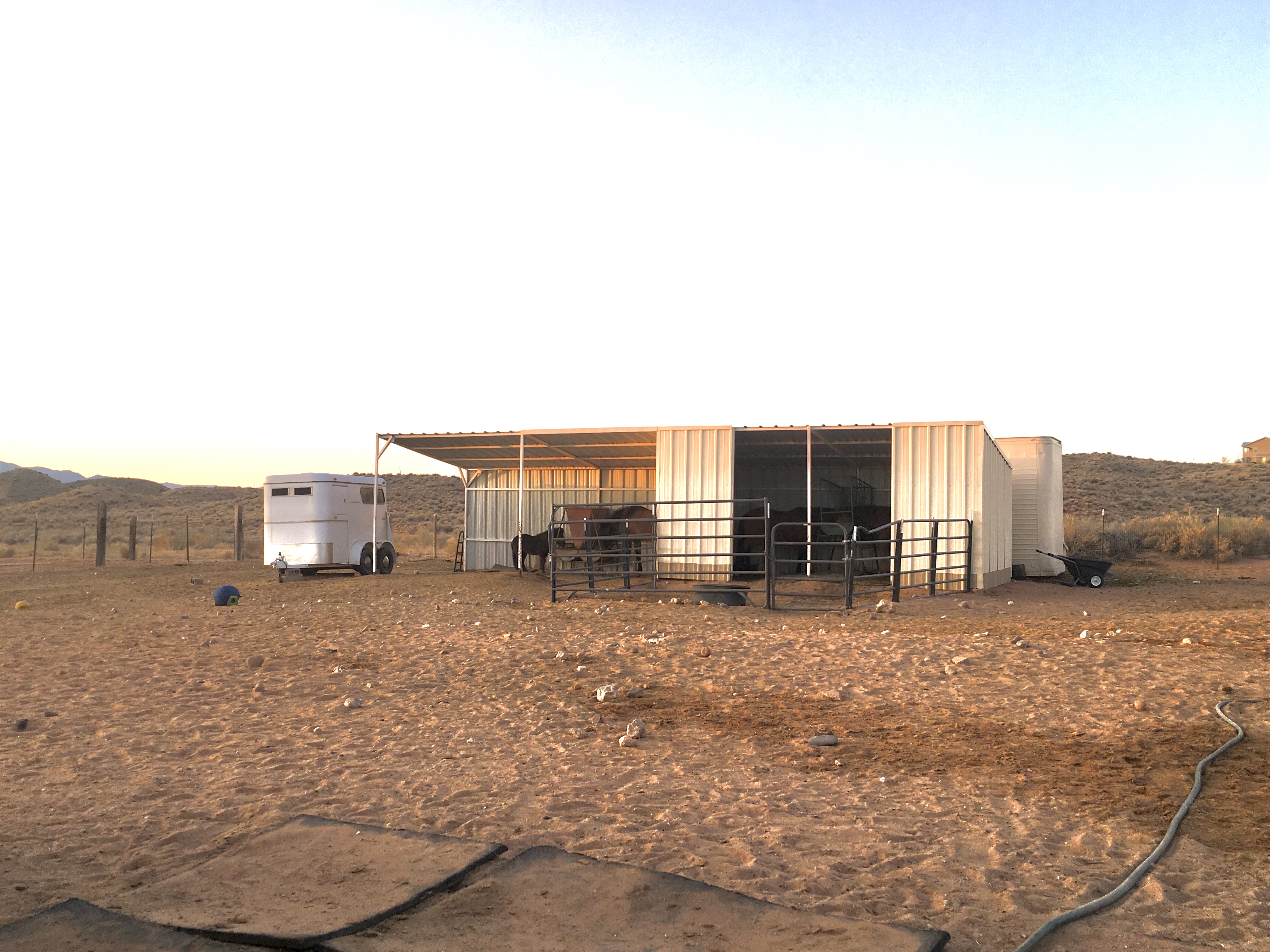
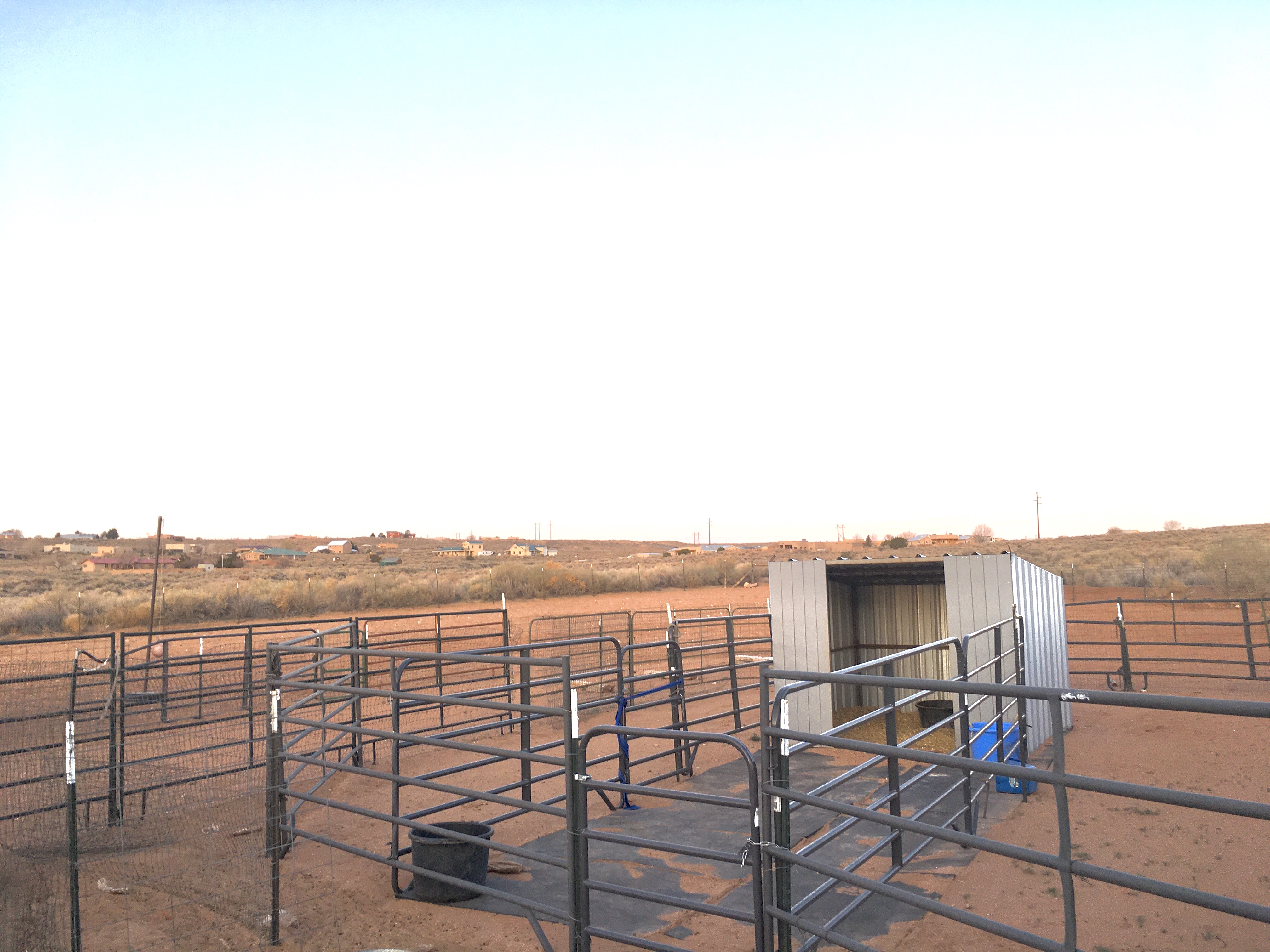
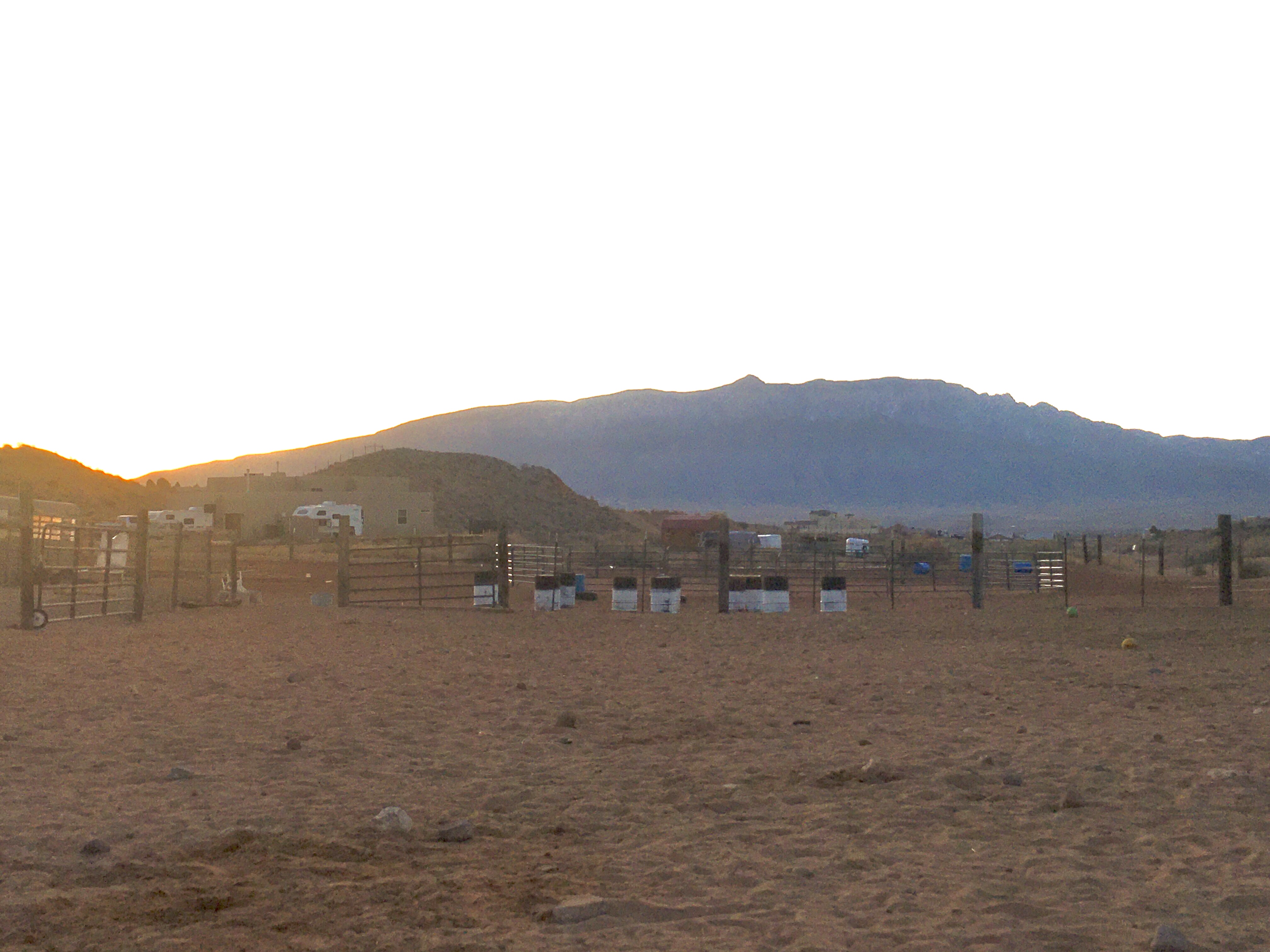
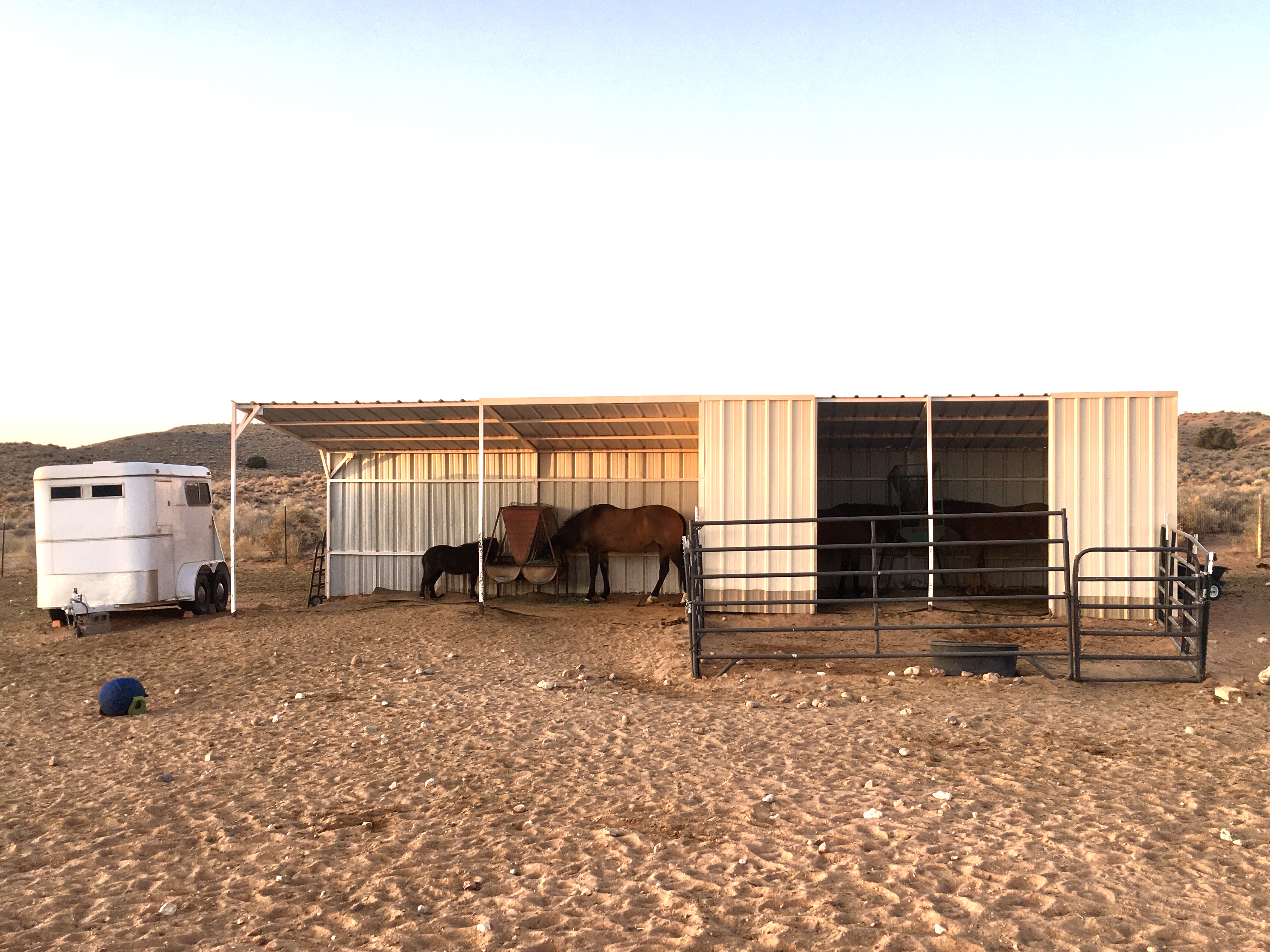

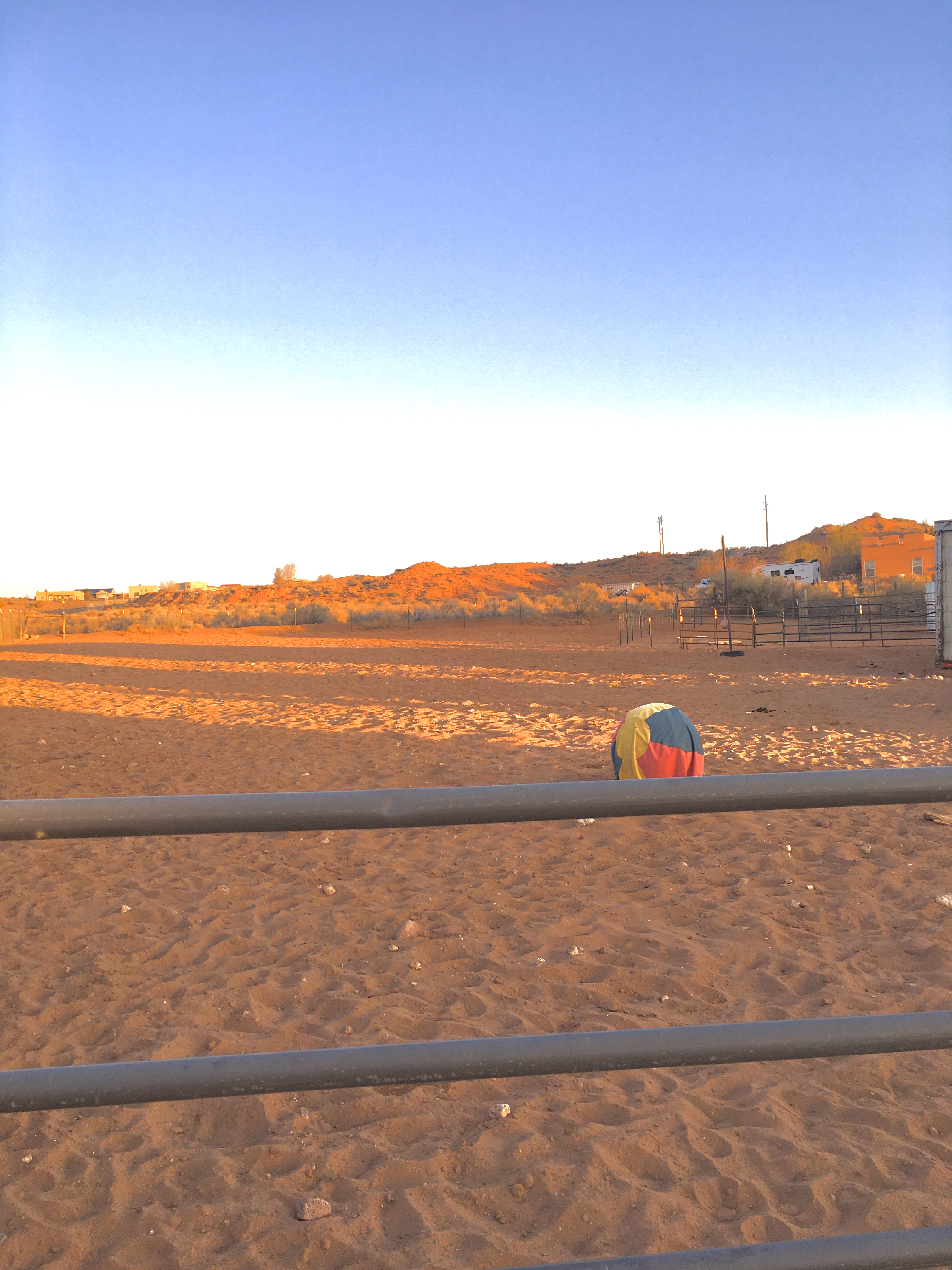
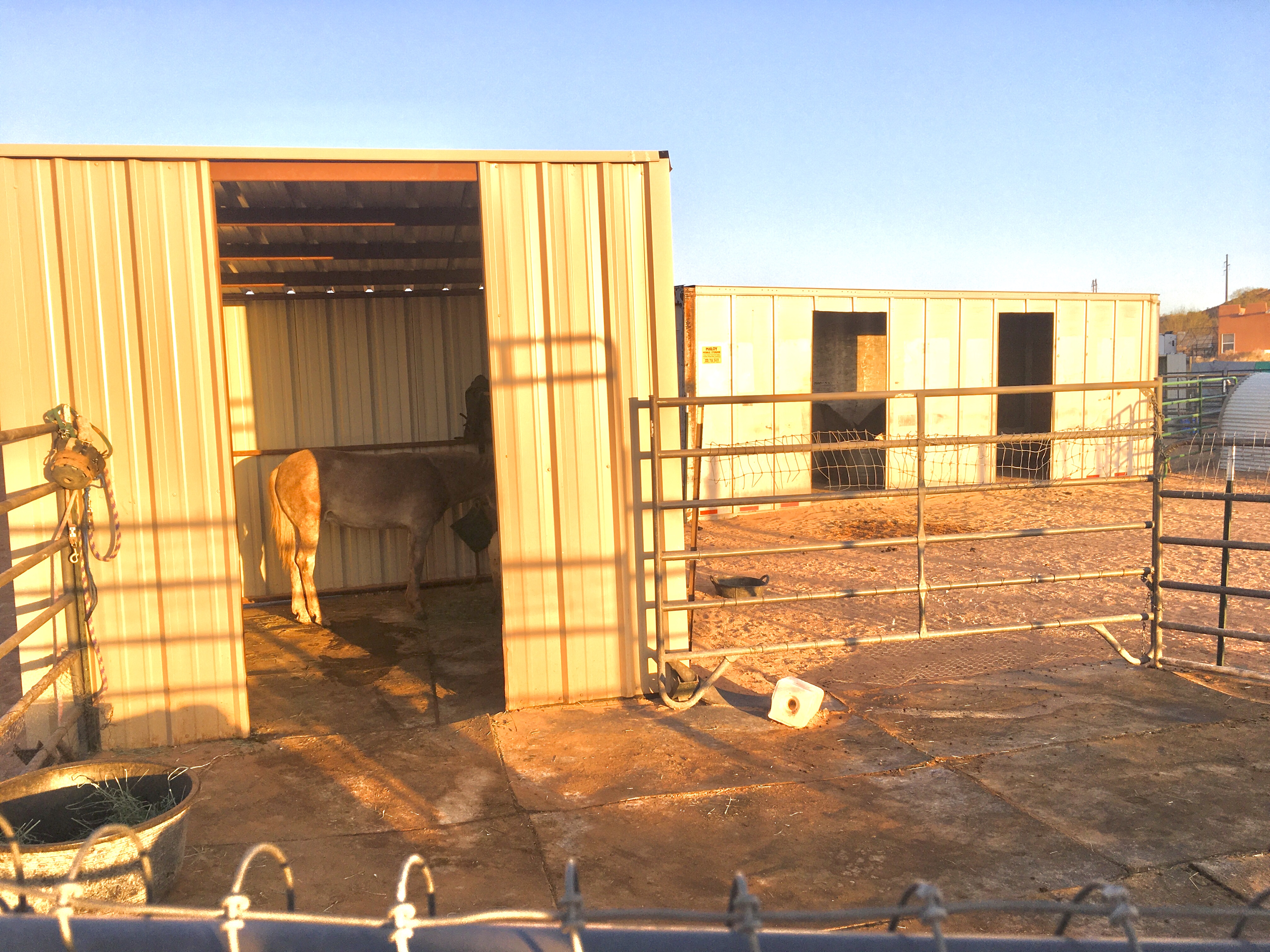
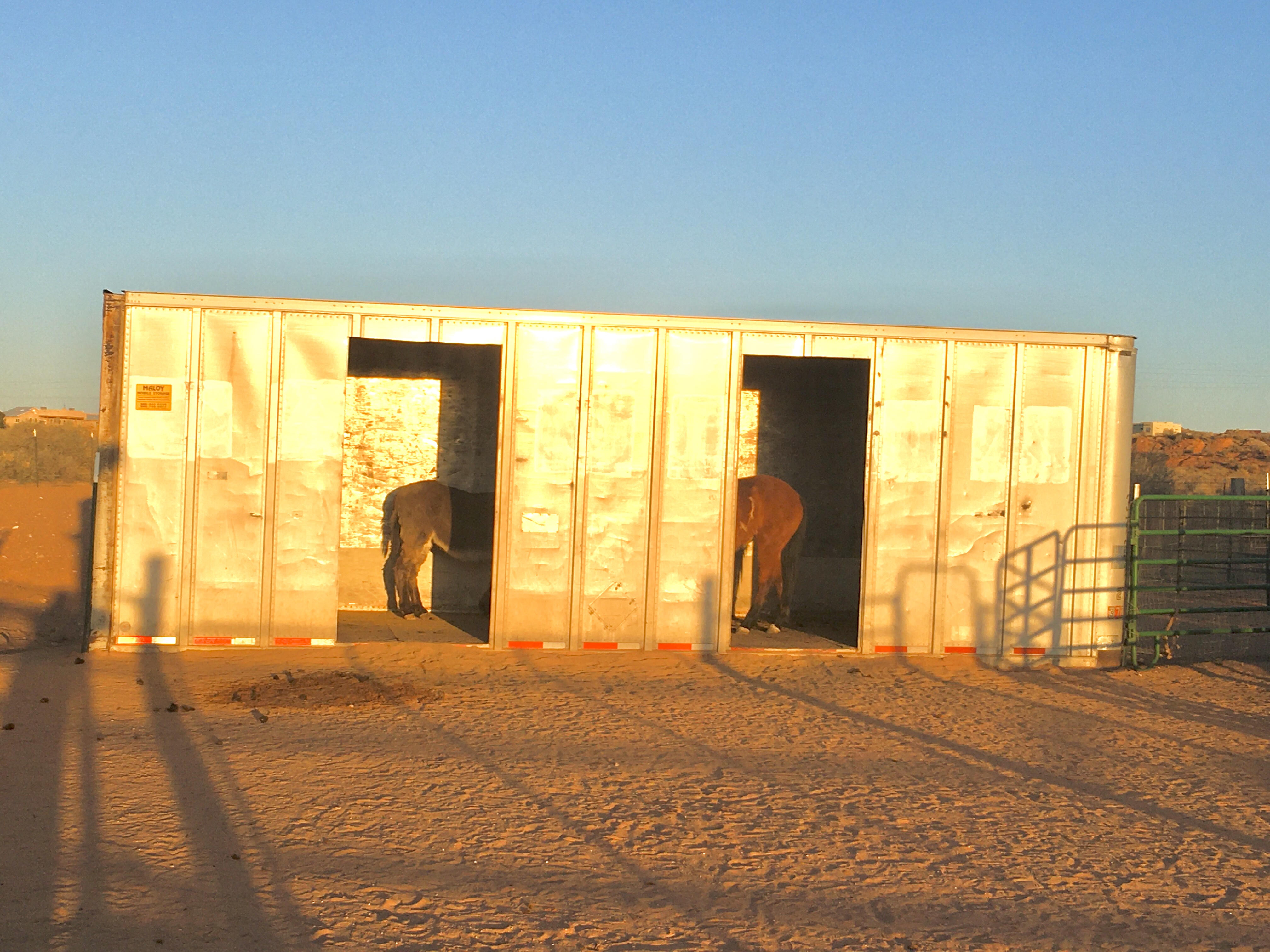
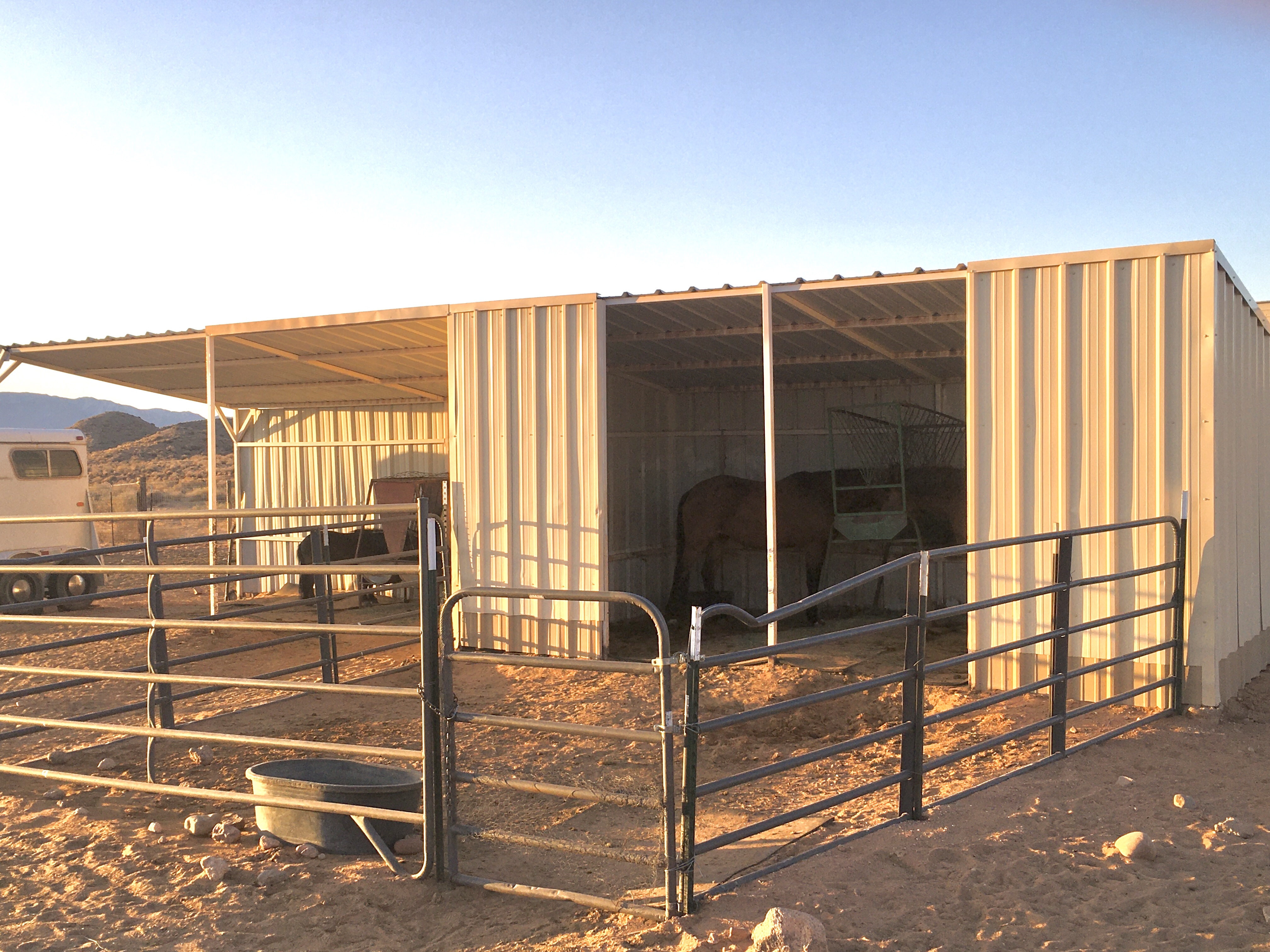
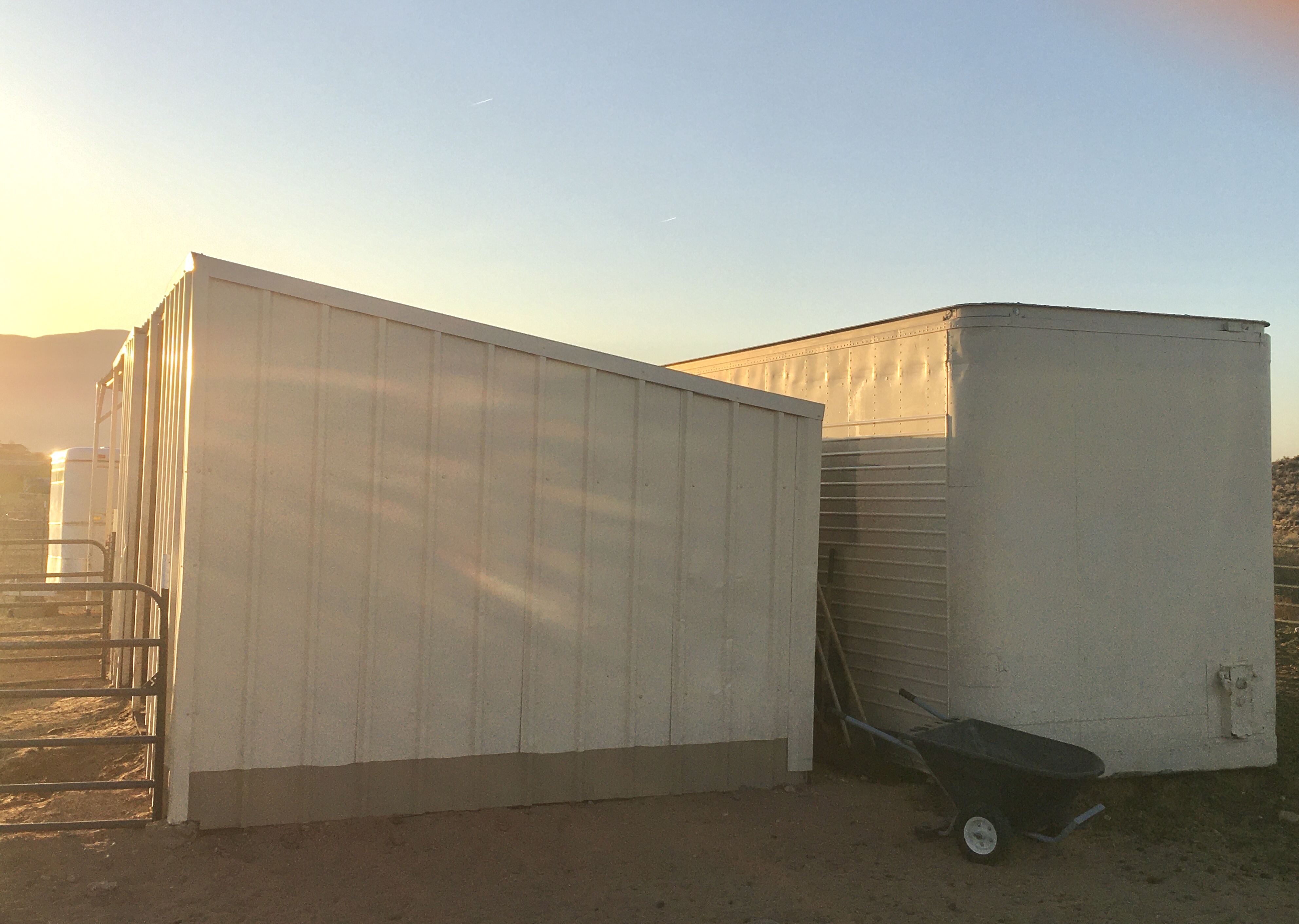


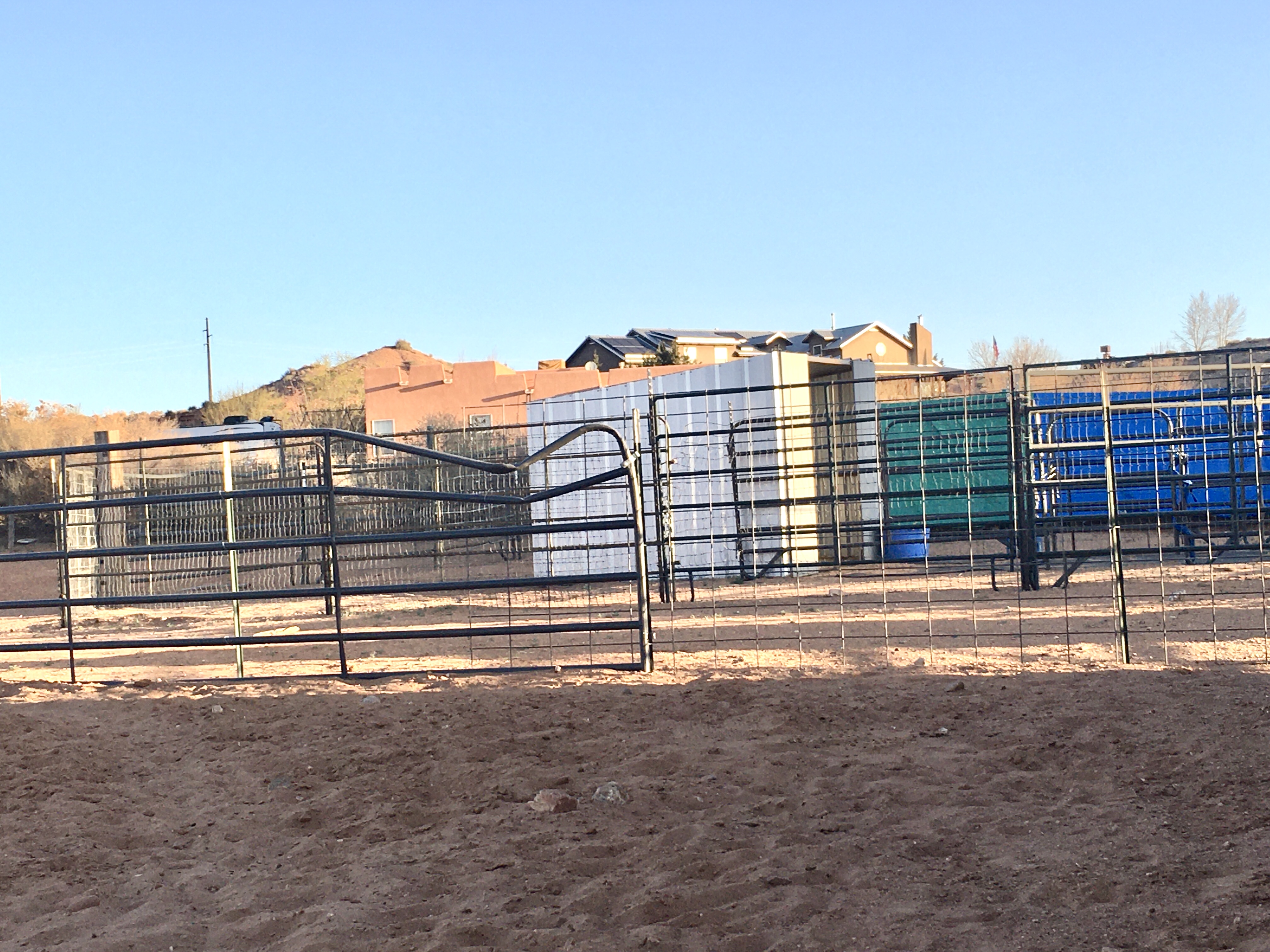
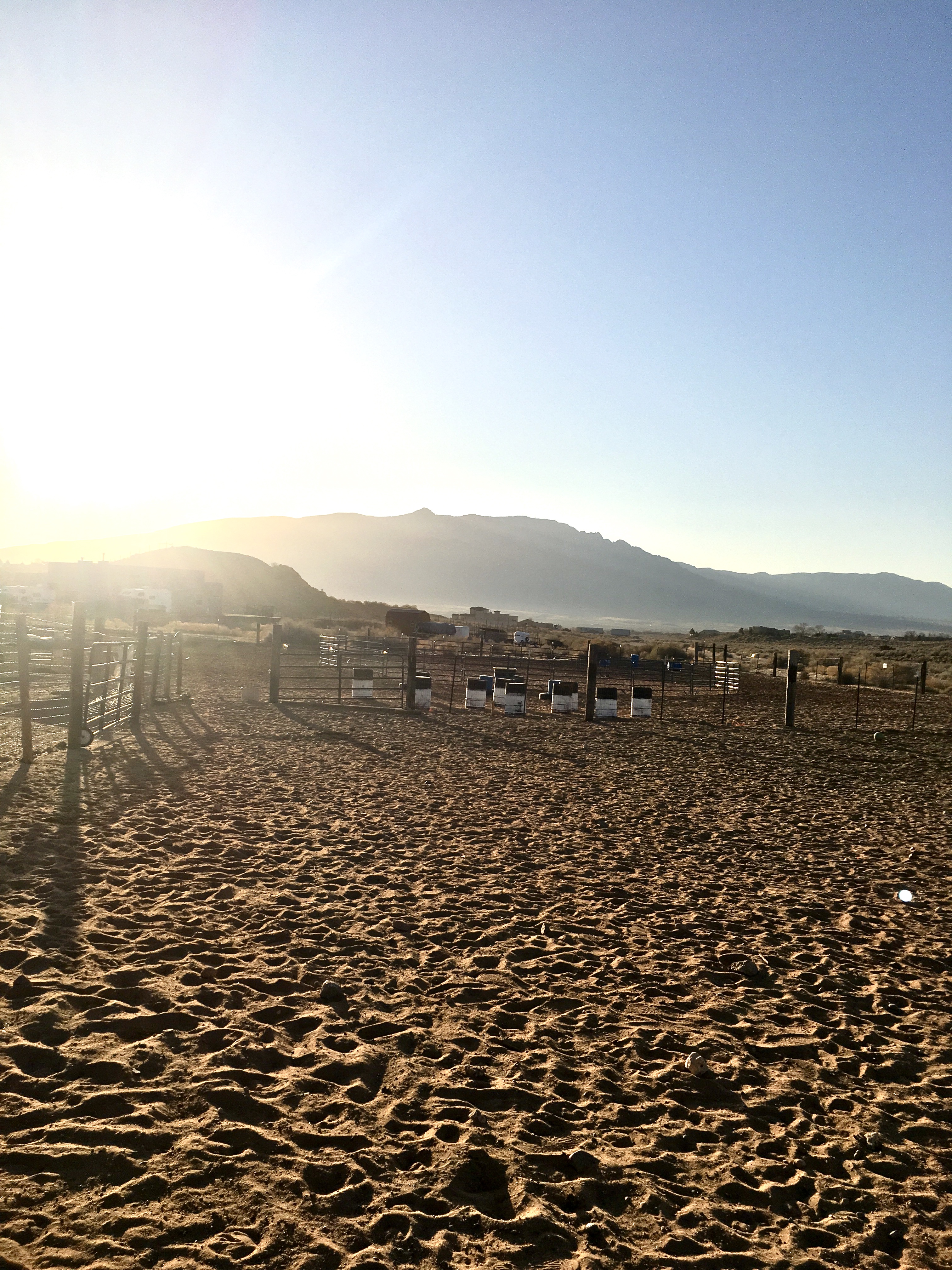
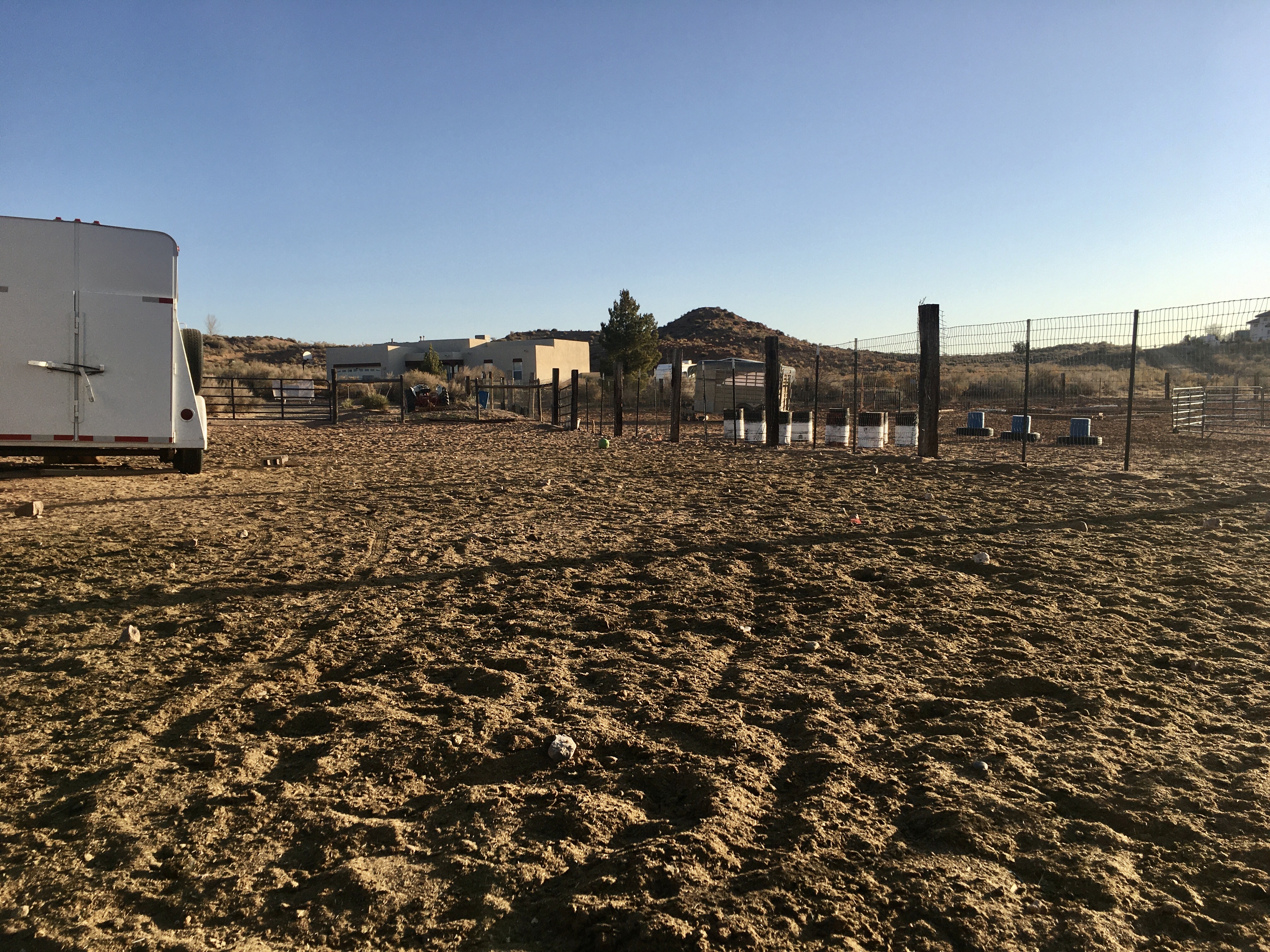

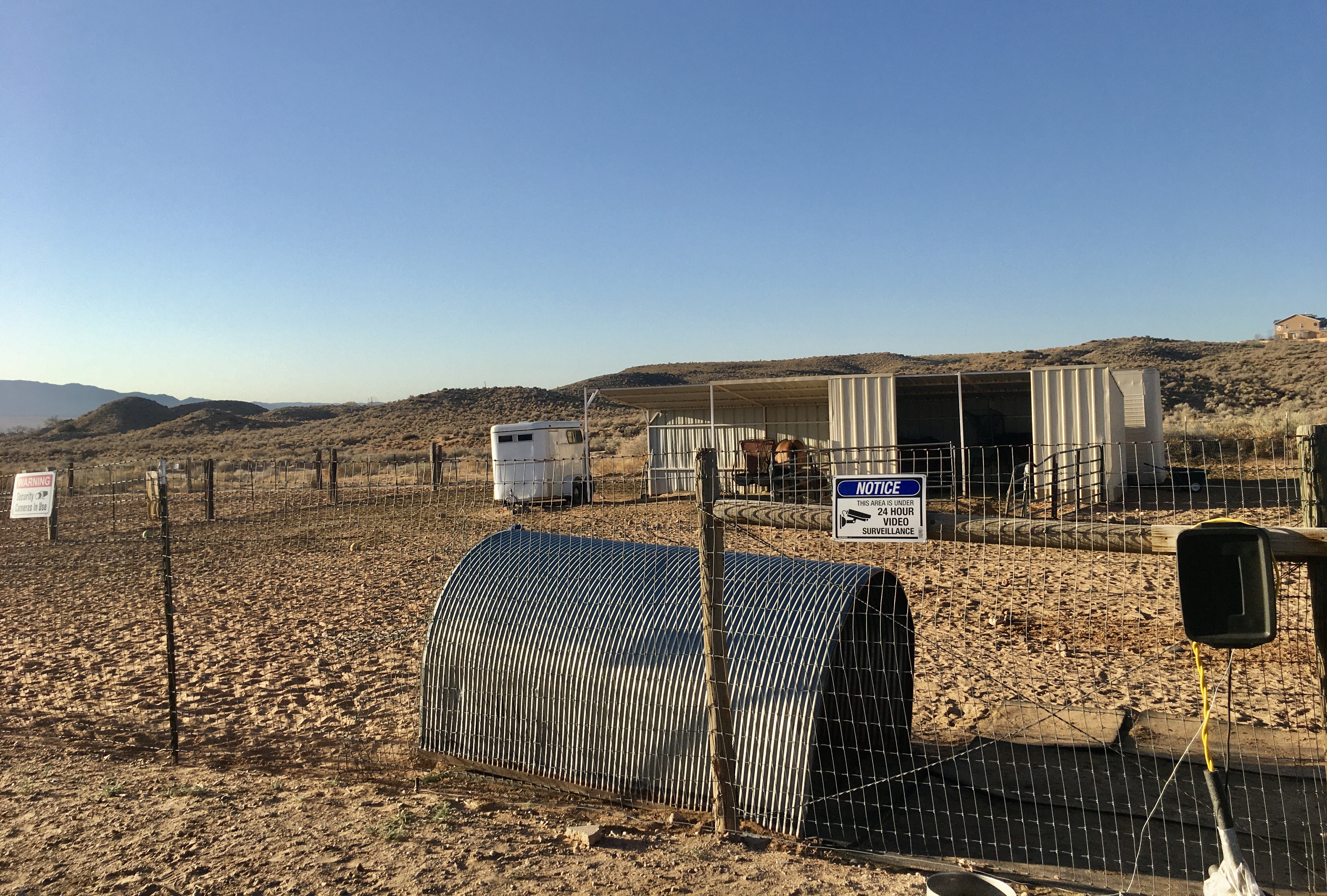
Are the organization's rules, restrictions and warnings (signage) conspicuously posted in easily accessible locations? Yes
Are the organization's emergency contacts, including veterinarian contact information, conspicuously posted in easily accessible locations? Yes
Are human and equine first aid kits easily accessible? Yes
Regarding all shelters where horses are housed including run-in sheds:
Do horses have assigned stalls in the barn/structure(s) or exclusively assigned shelter locations where they are separated from other horses with a barrier? Yes
How many hours per day, on average, are horses stalled or restricted to these sheltered exclusive shelter locations? 0-3;
How often are the stalls/shelters cleaned, i.e., kept in good repair and free of standing water, accumulated waste, sharp objects and debris? 6-7 Days a Week
Do all stalls/shelters allow horses to lie down, stand up and turn around and provide protection from inclement weather (wind, sleet, rain, snow and extreme temperatures)? Yes
Are stalls/shelters kept in good repair, with adequate ceiling height, and free of standing water, accumulated waste, sharp objects and debris? Yes
Are floors constructed and maintained for both good drainage and traction? Yes
Is there a ventilation and circulation system in place to allow free flow of air to control temperature, and humidity, and to prevent air stagnation? Yes
Is wiring inaccessible to horses and maintained for safety in all areas of facility? Yes
Are fire prevention/protection measures (fire alarms, extinguishers and sprinkler systems) maintained and in good working order? Yes
Is there adequate lighting to ensure safety in all areas of facility? Yes
How many hours per day, on average, are horses turned out:
Equines are out 24/7 except they are brought in to feed
The following describes the pastures at this facility:
This facility does not have pastures where equines can graze on pasture grass
Not Checked:
This facility has a written plan in place for pasture management, which includes guidelines for seeding, fertilizing, irrigation, mowing, dragging, harrowing, manure removal, removal of debris, the control of poisonous plants, and a schedule for cleaning
A dedicated staff person(s) is responsible for pasture management
All pastures are fenced to prevent escape or injury
Barbed wire is used for fencing
Electric fencing is used; electric wires or tape fence are visibly marked
Fencing checks, such as broken or missing planks, loose fence posts, exposed or loose nails, detached wires, etc., are done regularly
Pastures are rotated
Pastures have natural protection for equines (i.e., trees)
Pastures have man-made protection for equines (i.e., shelters)
This facility has a written plan in place for pasture management, which includes guidelines for seeding, fertilizing, irrigation, mowing, dragging, harrowing, manure removal, removal of debris, the control of poisonous plants, and a schedule for cleaning
A dedicated staff person(s) is responsible for pasture management
All pastures are fenced to prevent escape or injury
Barbed wire is used for fencing
Electric fencing is used; electric wires or tape fence are visibly marked
Fencing checks, such as broken or missing planks, loose fence posts, exposed or loose nails, detached wires, etc., are done regularly
Pastures are rotated
Pastures have natural protection for equines (i.e., trees)
Pastures have man-made protection for equines (i.e., shelters)
The following describes the turnout areas other than pastures at this facility:
This facility has a written plan in place for the maintenance of turnout areas, which includes a schedule for cleaning, manure removal, and dragging
A dedicated staff person(s) is responsible for the maintenance of turnout areas
All turnout areas are fenced to prevent escape or injury
Electric fencing is used; electric wires or tape fence are visibly marked
Turnout areas have man-made protection for equines (i.e., shelters)
Fencing checks, such as broken or missing planks, loose fence posts, exposed or loose nails, detached wires, etc., are done regularly
Not Checked:
This facility does not have turnout areas
Barbed wire is used for fencing
This facility does not have turnout areas
Barbed wire is used for fencing
The following policies and procedures are in place at the facility to restrict public access and to keep horses safe:
The property owner, staff member or caretaker lives on the premises and ensures that public access is restricted and is responsible for the security of the facility and equines
There is a practice in place to monitor equines overnight
No Trespassing signs are posted
Hold Harmless signs are posted
Authorized Personnel Only signs are posted
Entrance gates are locked at night
Visitors are only permitted at specific times
Visitors are only permitted in specific areas
The property is fitted with motion lights
The property is fitted with a security system that is monitored internally by staff (or the property owner)
The perimeter of the property is fully fenced
Not Checked:
A security guard is present at night
By Appointment Only signs are posted.
The property is fitted with a security system monitored by police or a professional service
A security guard is present at night
By Appointment Only signs are posted.
The property is fitted with a security system monitored by police or a professional service
Equine Care/Emergency Preparedness: Penny Lane Foal Rescue (*Main) 2026 and 2025 This section is required.
Horse Health Care/Barn Management Records: What system is used to collect and store health/horse care records?
Onsite computer with onsite backup storage system
Onsite computer with cloud-based backup storage system
The organization utilizes its own system to maintain records
The following items are consistent with our feed management plan and practices:
Equines are provided with individualized feeding plans, including supplements, according to the equine's age, breed/type, condition, size, work level and any health issues, consisting of nutritious food provided in sufficient quantity and access to adequate natural forage, or be fed daily, or as recommended by the organization's veterinarian
Feed plans are determined in consultation with a veterinarian
Supplement plans are determined in consultation with a veterinarian
Equines are fed grain in individual stalls
Equines are fed grain in groups
Staff and/or volunteers are trained in proper feed measurements and protocols and observed periodically to ensure they are feeding correctly
The feed chart is centrally located and updated as needed
The area(s) where hay, feed, grain, and supplements are stored are kept clean, free of debris and chemicals, and protected from weather and other animals in rodent-proof and mold-proof containers and grain bins
Feed, supplements and hay types are clearly labeled
Water sources, i.e., buckets, troughs, automatic waterers, etc. are kept clean, free of contaminants, debris and chemicals, protected from weather and other animals, and be positioned or affixed to minimize spillage.
Medications are kept in a secure area
Not Checked:
Is clean, potable water available at all times for all equines? Yes
Hoof Care: How often is hoof care provided for each equine? Every 4-8 weeks and when an issue arises
Dental Care: How often is dental care provided for each equine? Annually and when an issue arises
Horse checks: How often are equines visually and physically checked by personnel at the facility? Every day or 6 days a week
Our organization has the following parasite and fly/insect control protocols in place, including remedies used to control flies and insects:
Our organization follows the parasite control guidelines of our veterinarian, including fecal testing and de-worming
Fly/Insect Control Remedies:
Fly Traps and Tapes
Premise Sprays/Insecticides
Fly Spray Repellent
Fly Masks
Fly Sheets
Not Checked:
The following represent the biosecurity practices in place at facility:
Our organization follows the biosecurity guidelines of our veterinarian
Sick, affected and/or quarantined equines do not have contact with other equines or other animals
The organization has a written biosecurity plan
Staff are trained in best practices related to biosecurity
Volunteers are trained in best practices related to biosecurity
A specific individual is trained and assigned to care for sick, affected and/or quarantined equines
Sick, affected and/or quarantined equines are cared for last if the caretaker must also care for healthy equines
Restricted access signs are posted at primary points of access to sick, affected and/or quarantined equines
Hand sanitizers are available at all primary points of access to sick, affected and/or quarantined equines
Footbaths are available at all primary points of access to sick, affected and/or quarantined equines
Manure and bedding from sick, affected and/or quarantined equines is removed from the facility - not put in open air piles, and not spread on pastures
Quarantine areas, such as stalls, aisle ways, paddocks, and common areas, are cleaned (and needed, disinfected) after conclusion of the quarantine.
Trailers/vans used by sick, affected and/or quarantined equines are cleaned and disinfected after each use and cleaning takes place away from where equines are sheltered
Equipment used by sick, affected and/or quarantined equines is not shared
Equipment used by sick, affected and/or quarantined equines is cleaned of organic debris and disinfected after each use
Latex gloves, or equivalent gloves, are worn when working with sick, affected and/or quarantined equines
Not Checked:
Equines are not quarantined on arrival.
Equines are not quarantined on arrival.
The following represent the manure removal practices in place at facility:
Manure is piled in an area where equines are not located
Manure piles are covered
Manure is hauled, sold or given away
Manure piles are composted or spread on pastures
Our organization adheres to the manure management guidelines set by the state, local authorities, and/or our organization's veterinarian
Not Checked:
Manure is stored in dumpster(s)
Manure is stored in dumpster(s)
The following steps are taken to help staff and volunteers readily identify each horse on the property:
Equines are assigned the same exclusive stall/shelter location each day
A notebook or binder with photos and information on each equine is easily accessible
Equine photos and profiles are available on the website
Staff/volunteers are provided training on conformation, markings, colors, and breeds
Team leaders work with new staff/volunteers until they are able to identify the equines
Not Checked:
Name plates are located on the stall/shelter location
Photos are located on the stall/shelter location
Equines wear halters with nametags
A map/diagram is posted showing the location of each equine with equine names and photos
Staff and volunteers are provided with an information packet with equine profiles, including photos and detailed descriptions
Name plates are located on the stall/shelter location
Photos are located on the stall/shelter location
Equines wear halters with nametags
A map/diagram is posted showing the location of each equine with equine names and photos
Staff and volunteers are provided with an information packet with equine profiles, including photos and detailed descriptions
Our organization has the following policies and procedures in place pertaining to tack, apparel and equipment:
All equines have specifically assigned apparel, equipment and tack (saddles/bridles if ridden) that is not shared
Blankets, sheets and turn out apparel are fitted and utilized for each equine appropriate to the equine's needs and the weather conditions
Blankets, sheets and turn out apparel are cleaned regularly as needed
No equines are ridden; saddles, bridles, etc. not applicable.
Not Checked:
Saddles are shared
Saddle pads are shared
Bridles are shared
Bits are shared
Blankets are shared
Sheets are shared
Turnout apparel is shared
Halters are shared
Riding Tack is always cleaned after each use
Riding Tack is always cleaned at least weekly
Riding Tack is cleaned only when needed
Riding Tack is inspected for overall working condition before each use by trained personnel
Riding Tack is assessed for fit before each use by trained personnel
Riding Tack is assessed for fit by trained personnel when an equine's body condition changes
Riding Tack is assessed for fit by trained personnel when an equine's disposition changes
This facility enlists the services of a professional saddle fitter at least once a year
Assigned riding tack is clearly labeled
Riding Tack is stored in a climate-controlled location
Helmets are shared
Helmets are cleaned/disinfected after each use
Helmets are replaced after a fall
Helmets are replaced at least every five years.
Saddles are shared
Saddle pads are shared
Bridles are shared
Bits are shared
Blankets are shared
Sheets are shared
Turnout apparel is shared
Halters are shared
Riding Tack is always cleaned after each use
Riding Tack is always cleaned at least weekly
Riding Tack is cleaned only when needed
Riding Tack is inspected for overall working condition before each use by trained personnel
Riding Tack is assessed for fit before each use by trained personnel
Riding Tack is assessed for fit by trained personnel when an equine's body condition changes
Riding Tack is assessed for fit by trained personnel when an equine's disposition changes
This facility enlists the services of a professional saddle fitter at least once a year
Assigned riding tack is clearly labeled
Riding Tack is stored in a climate-controlled location
Helmets are shared
Helmets are cleaned/disinfected after each use
Helmets are replaced after a fall
Helmets are replaced at least every five years.
Emergency Preparedness: Penny Lane Foal Rescue: *Main This section is required.
The following plans, policies, and procedures are in place at the facility to handle emergencies and address weather related issues, fire safety procedures, and/or any additional hazardous scenarios the facility could potentially experience:
Emergency procedures are posted prominently
The facility owns or has access to a generator
The facility maintains at least two weeks of hay, feed, shavings and medications
The facility collects and maintains medical information from staff, volunteers, and clients
The facility maintains appropriate liability and/or workers' compensation insurance
The organization has a written emergency preparedness/safety plan (EPP)
Not Checked:
The written EPP addresses the following areas: Local fire department and/or the state's emergency planning department procedures
Medical emergencies for clients, staff, and volunteers
Medical emergencies for equines
Evacuation plans
Power outages
Fire
Natural Disasters - thunderstorm, hurricanes, earthquakes, tornados, etc
Protocols to notify emergency personnel
Not Checked:
Terrorist attacks
Building/facility exit plans
Terrorist attacks
Building/facility exit plans
The facility follows the specific procedures to help PREVENT emergency situations:
Smoking is strictly prohibited
NO SMOKING signs are posted prominently
Hay is stored away from permanent or temporary structures where equines are stalled
Permanent or temporary structures where equines are stalled are kept free of dust, cobwebs, trash, cleaning rags, and other flammable items
Aisles and doorways are kept clear
Heaters with automatic shutoff settings are used
Not Checked:
How often are the following checked or performed?
Fire Extinguishers are checked: Semi-annually
Smoke detectors are checked: Not at all/NA
Fence lines are checked: Weekly
Turnout Areas are checked: Weekly
Sprinkler systems are checked: Not at all/NA
Fire drills are conducted: Not at all/NA
Review of safety protocols with staff are conducted: Monthly
Review of safety protocols with volunteers are conducted: Monthly
The Emergency Preparedness Plan is reviewed and updated: Annually
Equine Transportation: 3= Onsite: 2 (2 + 0) + Offsite: 1
2-horse van/trailer with truck:
2 Owned onsite
3-horse van/trailer with truck:
1 Access offsite;